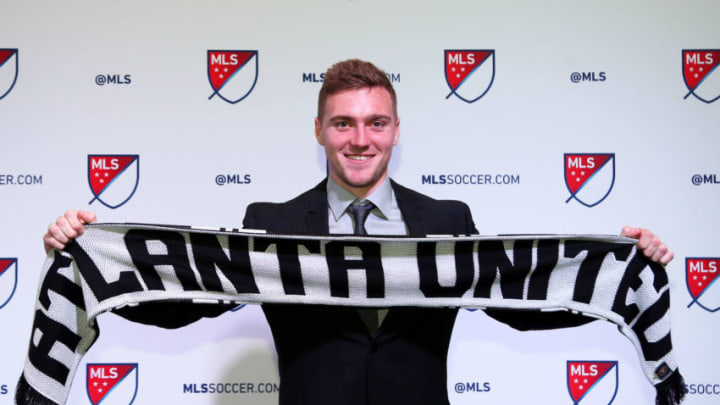Due to league-enforced financial restrictions, Julian Gressel is reportedly set to be traded to D.C. United from Atlanta United. The trade stems from salary cap rules that illustrate how MLS is a small-thinking league.
Atlanta United no longer have their second-ever SuperDraft selection. In one of the greatest drafts in history, which is shocking in and of itself, the Five Stripes selected Miles Robinson with the second-overall pick before returning to the eighth pick to select Julian Gressel.
Robinson is still with the team and seems set for another crucial year at the heart of Frank de Boer’s defence after a steller 2019 season. But Gressel, who has been had the more impactful career to date despite Robinson’s emergence, is no more.
The German was traded to D.C. United on Tuesday for up to $1.1 million in allocation money, consisting of $650,000 2020 Target Allocation Money, $100,000 in 2021 TAM, and another $350,00 TAM based on performance-related clauses. It is a semi-decent haul, one of the largest in league history, but that is not why Atlanta United are willing to sell.
The only reason why Gressel is walking out the Mercedes-Benz Stadium door is money. The 2017 Rookie of the Year who has a remarkable 15 goals and 35 assists in 98 matches for the Five Stripes, wanted to be paid relative to his quality and production. He was still tied to his rookie deal for another year and felt that he deserved a bumper pay rise. You can hardly blame him.
Speaking towards the end of last season with Doug Roberson of the Atlanta Journal-Constitution, Gressel said:
"“It’s come to a point where I’ve produced a lot,” he said in the report. “I’ve played well. I should reap the benefits of that. I want to do that. If it’s here, if the club wants to make me a priority here, I would love to be here. If the club decides not to make me a priority here, I would love to go somewhere where I can be a priority.”"
And make no mistake, Atlanta United wanted to keep him. Gressel had been a crucial part of their brilliant three-year existence thus far and was viewed as a critical piece in de Boer’s puzzle moving forward. His versatility, delivery from out wide, and offensive output all made him one of the most impactful players Atlanta possessed. There is only one reason why Gressel is no longer an Atlanta United: money.
More from MLS Multiplex
- Javier Milei Elected in Argentina: Potential Impacts on MLS and Signings of Argentine Players
- Orlando City and New York City FC in the Battle for Matías Arezo; Grêmio Enters Negotiations! Who Will Come Out on Top?
- USA, Honduras, Panama, and Canada Close in on a Spot in the 2024 Copa America
- De Gea Turns Down Al-Nassr’s Lucrative Offer: Speculation Points to Possible Reunion with Messi at Inter Miami
- Messi’s Magnetic Impact in the United States
As an American league, obsessed with parity and fairness, Major League Soccer enforces ridiculous salary cap rules that restrict teams from fully investing in their squad as they would like. Atlanta have the financial power to sign Gressel to a bumper long-term deal. They also have the motivation to. They simply are not allowed to because of the archaic MLS rules.
While MLS Commissioner Don Garber may claim that he wants to see teams in his league compete globally, especially with Liga MX sides in the CONCACAF Champions League, and while there may be a general, vague intention of seeing American and Canadian clubs signing some of the best players in the world before they reach near-retirement age, that will never be possible if MLS never loosens the restrictions.
Atlanta, like many other teams in the league such as Toronto, both Los Angeles teams, Inter Miami and others, are a big-thinking organisation. But they are confined by a small-thinking league that does not realise it is a part of a global sport. Football is not confined to North America like Basketball, American Football or Baseball. It is a part of something bigger, greater, and the leagues must be managed differently because of it.
It is time for MLS to loosen the ropes, forget about parity, allow teams to spend lavishly and invest heavily, and let them soar. MLS is a small-thinking league, and the Julian Gressel trade is a perfect illustration of that.
